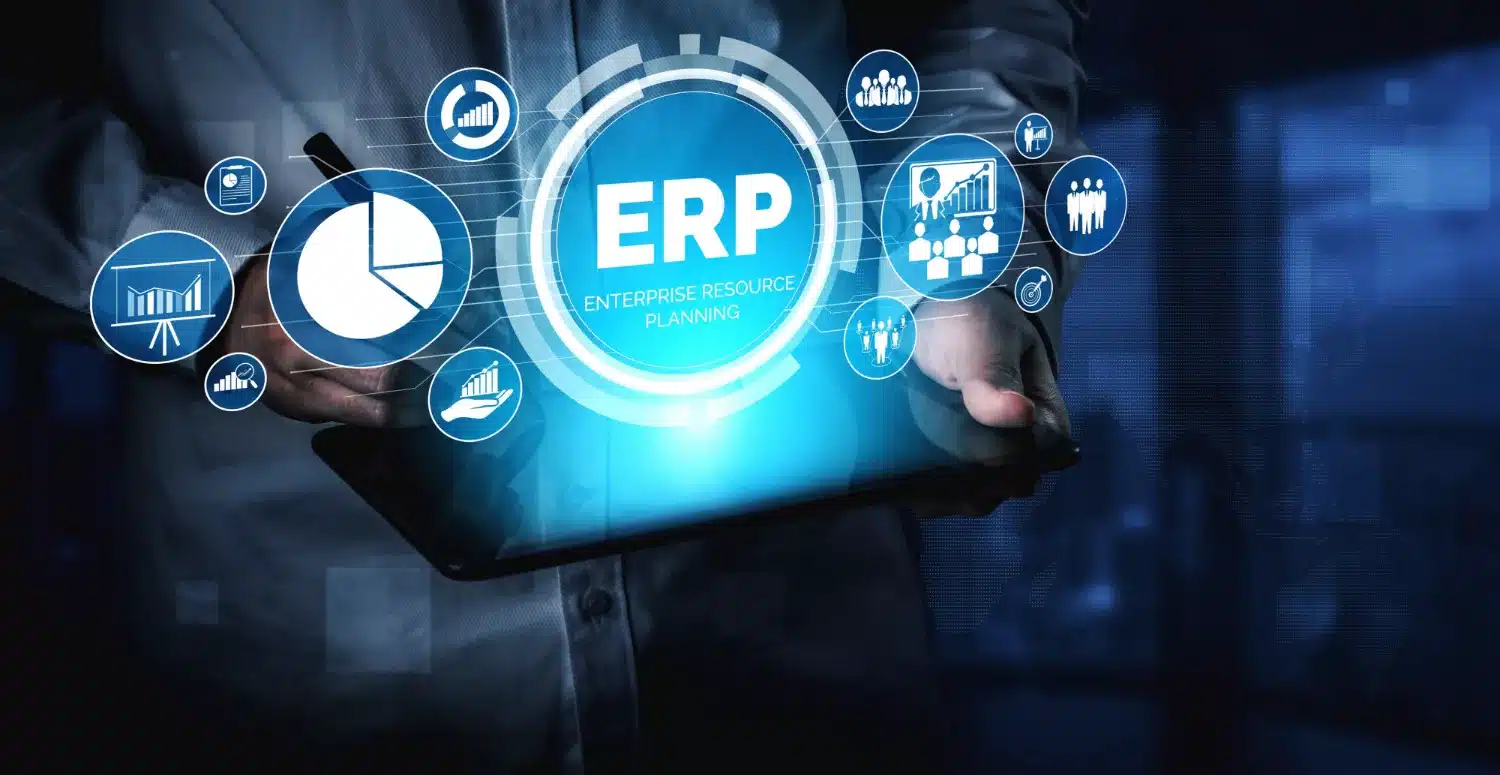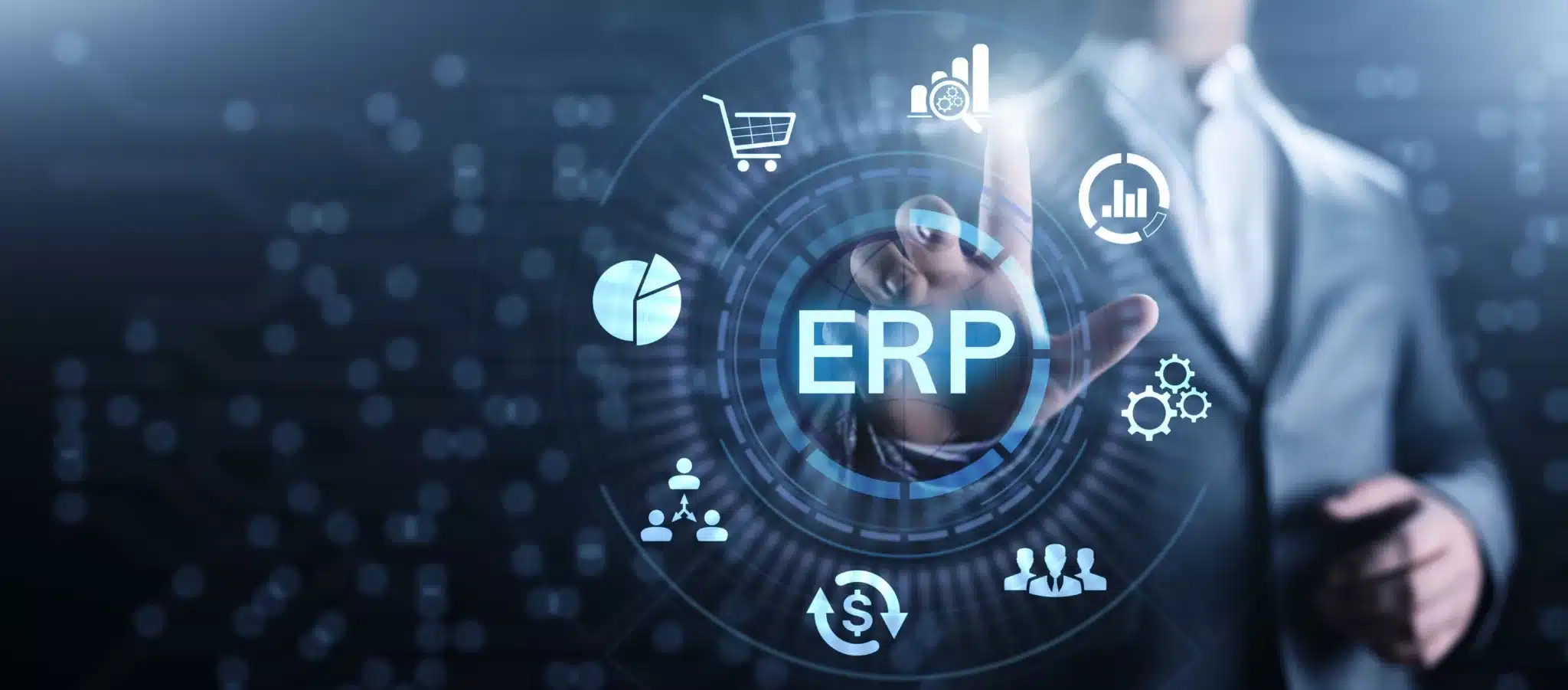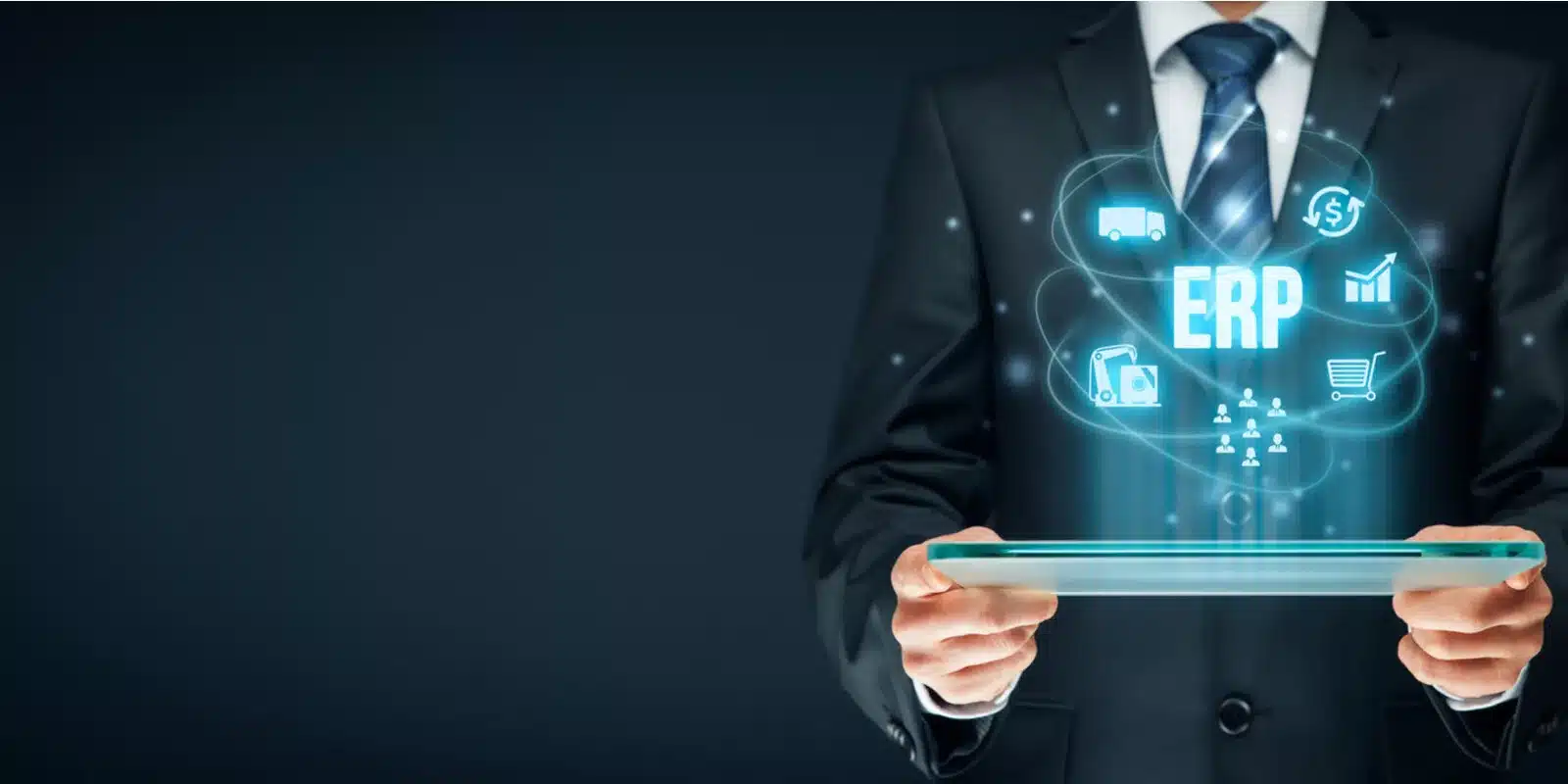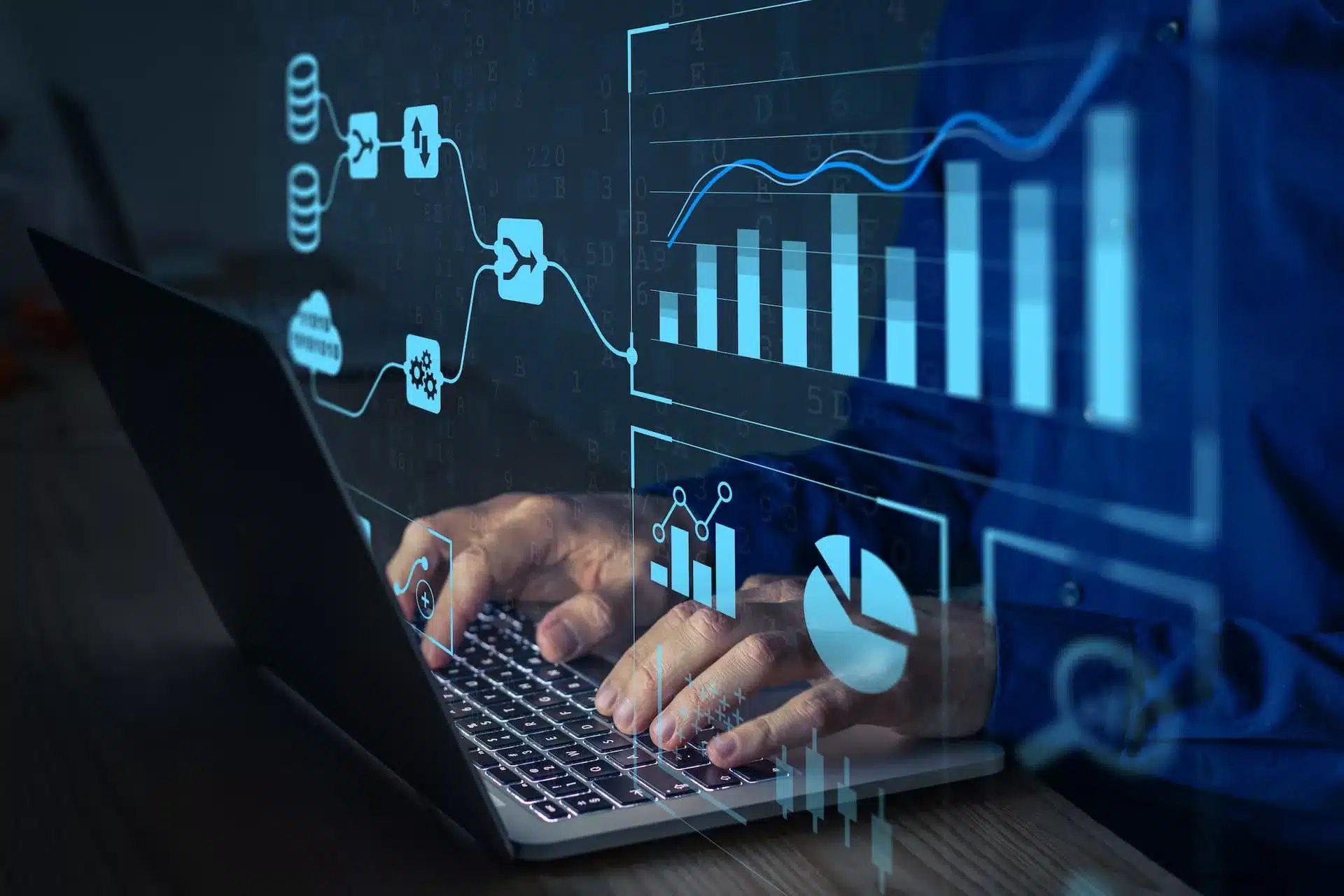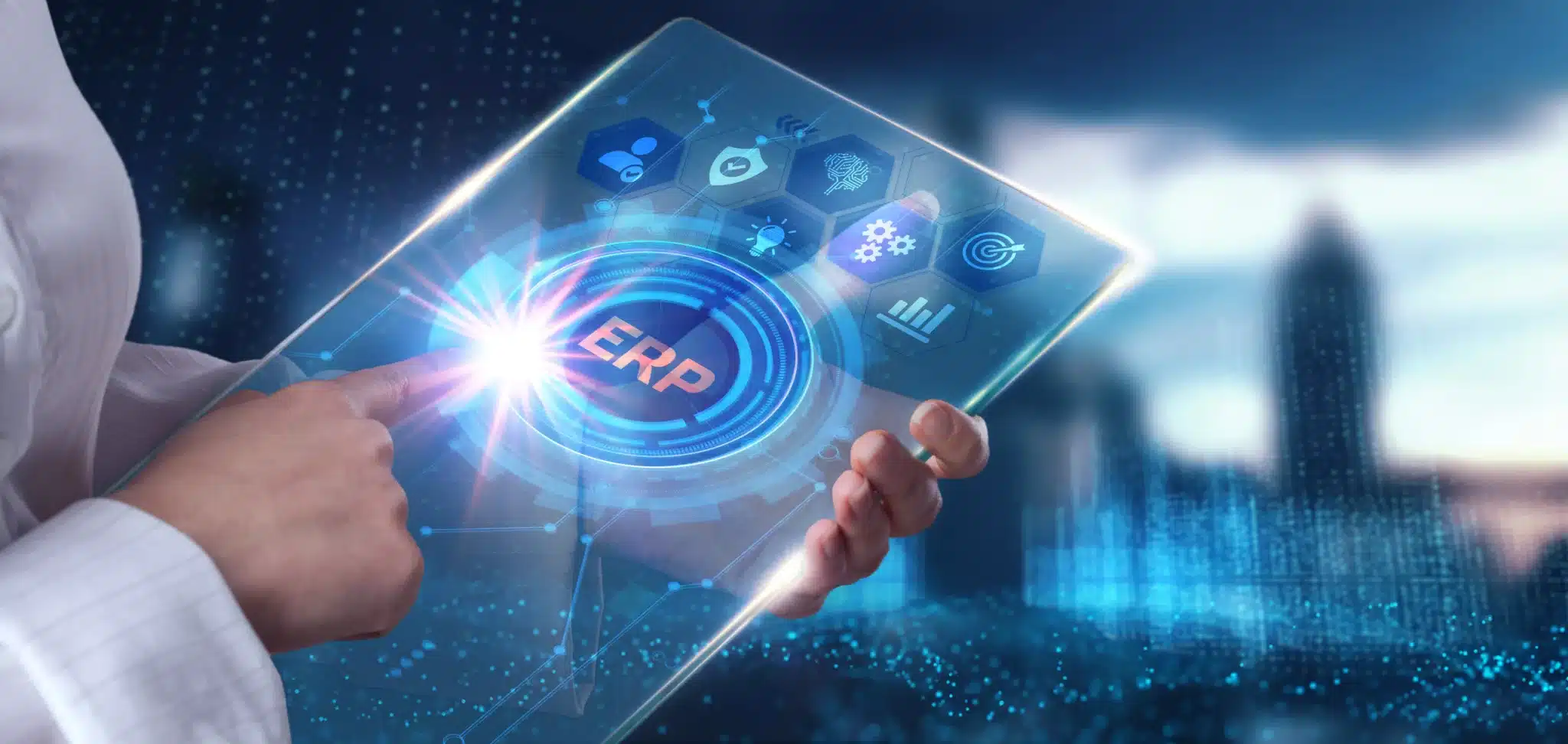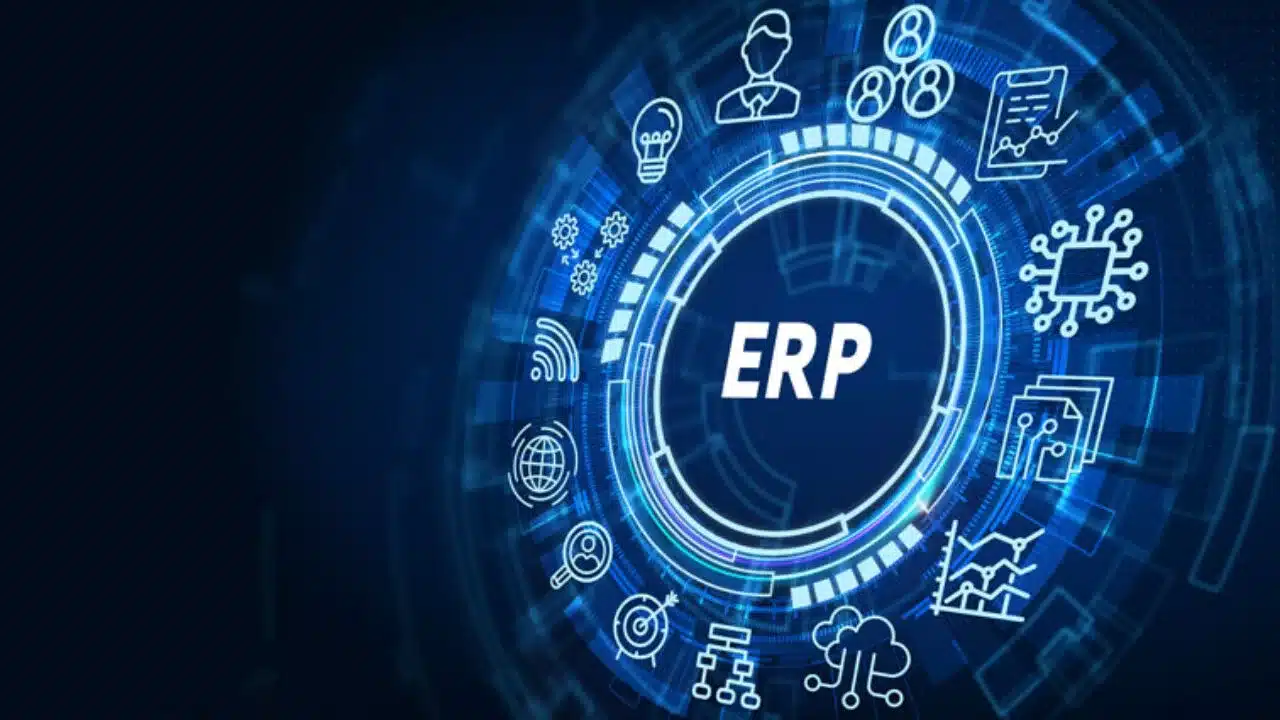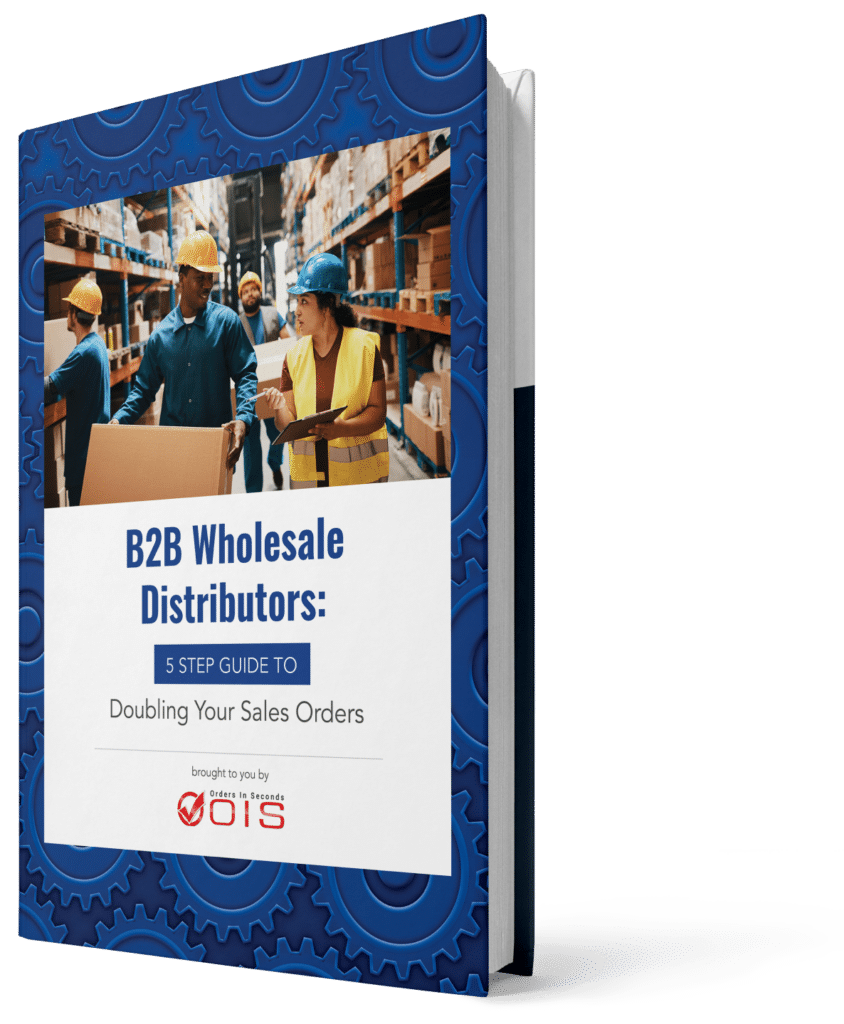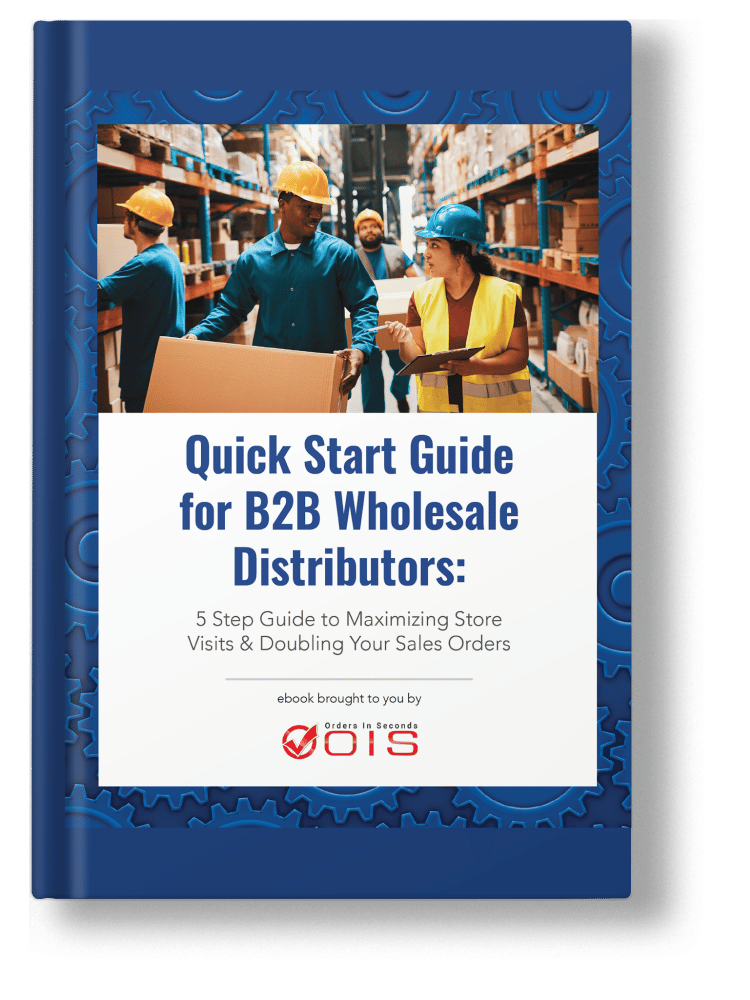What Is An Enterprise Resource Planning (ERP) System?
An Enterprise Resource Planning system is a set of integrated software applications that allow the automation of many business practices related to the operational or productive aspects of a company, simplifying and centralizing the information of all the areas that compose it: purchasing, production, logistics, finance, human resources, marketing, services, projects, customer management, crm systems, expense management, and human capital management.
Enterprise Resource Planning (ERP) is a critical requirement for businesses that want to optimize their operations and streamline their processes. An enterprise processing system can help businesses manage their master data, transactional data, and enterprise data more effectively. By centralizing all data into one system, businesses can make more informed decisions and improve their efficiency. ERP systems also automate tasks such as data management, report generation, and order processing, reducing manual effort and errors.
Enterprise Resource Management (ERP) refers to a comprehensive suite of software applications designed to integrate and automate key business processes across an organization. ERP applications provide functionality to manage various business functions such as finance, human resources, sales, and supply chain management. ERP integrates key business functions and supports core business operations.
An ERP system is a business management software that provides a centralized platform for managing and sharing data across departments and business functions.
It is important to note that product lifecycle management (PLM) is distinct from ERP; PLM focuses on managing a product’s lifecycle from concept to end-of-life, while ERP handles broader business operations.
Enterprise Resource Planning (ERP) software can help improve supply chain management by automating supply chain processes and providing real-time visibility into inventory levels, production schedules, and customer demand. An efficient supply chain management strategy can help organizations optimize their supply chain processes, reduce costs, and improve customer satisfaction.
ERP systems provide a robust set of tools to support efficient supply chain management processes, including procurement, inventory management, production planning, and order fulfillment. By leveraging ERP software, organizations can improve their supply chain management processes and drive operational efficiencies.
What is an ERP System?
An Enterprise Resource Planning (ERP) system is a type of software used by organizations to manage and integrate the crucial parts of their businesses. An ERP software system can integrate planning, purchasing inventory, sales, marketing, finance, human resources, and more. It is designed to streamline processes and information across the entire organization, facilitating the flow of data between all business functions and managing connections to outside stakeholders. By providing a centralized repository for information, ERP systems help improve productivity, enhance efficiency, and ensure that information is easily accessible and consistent across the enterprise. ERP systems support business growth, scalability, and compliance by automating and streamlining core processes, which improves efficiency and decision-making. Additionally, ERP systems enhance customer service by providing quick access to information and improving order accuracy, leading to higher customer satisfaction.
Is an ERP System easy to learn?
Learning an ERP system can vary in difficulty depending on factors such as the complexity of the software and the user’s familiarity with similar systems. While some ERP systems may have intuitive interfaces and user-friendly features, others might require extensive training and experience to master.
What are ERP Systems examples?
Examples of ERP systems include SAP ERP, Oracle ERP Cloud, Microsoft Dynamics 365, and NetSuite. These systems integrate various business processes such as finance, human resources, supply chain management, and customer relationship management into a single platform, streamlining operations and improving efficiency.
Can ERP Systems be capitalized?
Yes, ERP systems can be capitalized as they are considered long-term assets that provide significant benefits to a business over multiple accounting periods. Companies typically capitalize the costs associated with implementing and customizing an ERP system, including software licenses, implementation services, and related infrastructure expenses.
How can an ERP System help a business?
An ERP system can help a business by providing a centralized platform for managing core business processes such as accounting, inventory management, procurement, and sales. By integrating these processes, an ERP system enables real-time visibility into operations, improves decision-making, enhances collaboration, and increases overall productivity.
What are ERP System benefits?
The benefits of an ERP system include improved operational efficiency, enhanced decision-making capabilities, better customer service, streamlined business processes, reduced costs, increased data accuracy, and compliance with regulatory requirements. ERP systems also generate accurate and timely financial reports, supporting compliance and informed decision-making. They enhance risk management by helping identify and control business risks. Advanced predictive analytics within ERP systems enable better forecasting and strategic planning. Additionally, ERP systems implement advanced data security protocols to protect sensitive information and ensure regulatory compliance. By consolidating data and automating routine tasks, an ERP system helps businesses become more agile and competitive in today’s fast-paced market.
Why is ERP System important?
An ERP system is important because it serves as the backbone of modern businesses, facilitating the integration and automation of various departments and processes. By providing a unified view of operations and enabling efficient resource allocation, an ERP system helps businesses optimize performance, adapt to changing market conditions, and achieve long-term growth and success.
What Does ERP Mean in Business?
In business, ERP stands for Enterprise Resource Planning. It signifies a strategic approach to managing a company’s resources more effectively. By implementing an ERP system, businesses can automate and integrate core processes, ranging from finance and HR to manufacturing and supply chain operations. ERP systems enable real-time visibility into operations, which helps businesses make data-driven decisions, improve collaboration across departments, and enhance overall efficiency. In essence, ERP in business is about leveraging technology to optimize the use of resources, reduce costs, and drive growth.
What is an ERP Software System?
An ERP software system is a comprehensive suite of integrated applications designed to manage and automate various business processes. This type of system provides a central platform where different business functions can share and access data in real time. Key modules in an ERP software system typically include finance, human resources, sales, procurement, inventory management, and more. Modern ERP systems may also incorporate machine learning to enhance automation, predictive analytics, and real-time insights across key business functions. By using an ERP software system, businesses can streamline operations, improve information accuracy, enhance productivity, and gain insights that support strategic decision-making.
ERP Systems
What is an ERP System and What Is Its Role?
Enterprise Resource Planning (ERP) software enables organizations to use the entire suite of integrating applications. ERP software automates and streamlines operations to make operations easier. ERP enables the full visibility into business operations.
ERP stands for Enterprise Resource Planning. It is an underlying software and system for business management, including production, service management, finance, and other business functions. Enterprise Resource Planning can help automate and simplify individual activities within the business, including accounting and purchasing, project management, and business relationship management. For those enrolled in a project management course, understanding how ERP systems support and enhance project workflows is essential for effective planning, execution, and delivery.
Understanding ERP: Full Form and Key Features
ERP, or Enterprise Resource Planning, is a type of business intelligence software that helps organizations manage their operations, resources, and data from a single platform. The ERP acronym in business stands for Enterprise Resource Planning. ERP software solutions offer features such as inventory management, supply chain management, financial management, and human resources management. By using an ERP package, organizations can optimize their business processes, reduce costs, and improve efficiency.
Understanding ERP: Define, Products, and Software Companies
ERP Define: Enterprise Resource Planning (ERP) is a business management software that integrates all core business processes such as accounting, human resources, supply chain, customer relationship management, and inventory management. The main objective of an ERP system is to provide real-time access to relevant data, improve collaboration and efficiency, and automate routine tasks to reduce operational costs. ERP systems typically consist of a suite of modules that can be customized to meet the unique requirements of each business. These systems are designed to streamline business operations and help businesses make data-driven decisions.
ERP Products and Software Companies: There are many ERP products and software companies in the market that offer a range of solutions to meet the needs of different industries. Some of the top ERP products include SAP, Oracle, Microsoft Dynamics, and Infor. These products offer a range of features and functionalities that cater to the specific needs of each business. ERP software companies provide implementation, customization, training, and support services to ensure that businesses can get the most out of their ERP system. When selecting an ERP software company, it is essential to consider factors such as the vendor’s reputation, experience, expertise, and customer support. A good ERP software company should be able to provide comprehensive training and support to help businesses implement and use their ERP system effectively.
ERP, or enterprise resource planning, is a software system used by businesses to manage their operational and transactional data. ERP system processes include the integration of data from different departments such as finance, human resources, and sales, into a central database. This allows for real-time data analysis and reporting, streamlining business processes and increasing productivity. The functionalities of an ERP system include inventory management, customer relationship management, and supply chain management, among others. ERP system examples include SAP, Oracle, and Microsoft Dynamics.
When it comes to ERP system price, it can vary greatly depending on the size and needs of the business. Cloud-based ERP solutions, including SaaS options, often offer lower upfront costs by eliminating hardware and initial licensing expenses, making them more affordable compared to traditional on-premises solutions. The enterprise resource planning software price can range from a few thousand dollars to millions of dollars, depending on the number of users, modules, and customization required. To ensure businesses choose the right ERP system, ERP recommendations should be based on a thorough analysis of the company’s needs and objectives. It’s essential to choose a system that can effectively streamline and automate business processes, ultimately leading to increased efficiency and profitability. Co to jest ERP system refers to what an ERP system is in Polish.
Definition of Enterprise Resource Planning (ERP)
Enterprise resource planning refers to software used by organizations to run their daily business operations. A full ERP system is also integrated with a business performance manager that provides tools for planning, budgeting and predicting financial performance. ERP systems combine many business processes enabling information flows between them. By combining the data collected by different sources of transaction data, ERP solutions eliminate data duplication and ensure data integrity.
Enterprise Resource Planning software prices can vary significantly depending on the size and complexity of the solution required. In Florida, there are many enterprise resource planning solutions available, ranging from off-the-shelf solutions to customized solutions tailored to a specific business’s needs. Modern ERP solutions support the integration of different systems and processes, which helps businesses avoid the challenges of managing different systems separately. One of the main challenges of ERP is maintaining data quality. Poor data quality can negatively impact the business’s decision-making, resulting in incorrect and inaccurate information. Therefore, it is essential to have data governance and data quality practices in place to ensure the accuracy of the data being used. Data migration is also a critical step in ERP implementation, involving the preparation, cleaning, validation, and secure transfer of data into the new system.
▸▸ What Are You Waiting For? Download Our FREE In-Depth Guide for B2B Wholesale Distributors Today!
ERP System Processes: Streamlining Business Operations
Enterprise Resource Planning (ERP) systems are designed to streamline business operations by integrating and automating key processes. ERP systems typically include modules for financial management, human resources, supply chain management, and customer relationship management. By providing a unified view of business operations, ERP systems enable organizations to make more informed decisions and improve operational efficiency.
How ERP Works: A Closer Look
ERP systems work by integrating data from across an organization’s various business functions, providing a single source of truth for decision making. Information is entered into the ERP system through various channels, such as manual data entry or automated data feeds. The ERP system then processes this data, applying business rules and workflows to automate key processes and ensure data accuracy. The system also generates reports and dashboards that provide insight into key performance indicators, enabling organizations to make data-driven decisions.
How ERP Works in an Organization: Benefits and Considerations
Implementing an ERP system can provide significant benefits for organizations, such as improved efficiency, better decision making, and enhanced collaboration. However, there are also considerations to keep in mind when implementing an ERP system, such as ensuring data quality and security, managing system upgrades and customization, and providing training and support for employees. When deploying ERP software, it is important to select the right ERP deployment model—on-premises, cloud, or hybrid—to best meet the organization’s needs. Each ERP deployment model has its own characteristics: on-premises offers greater control and customization, cloud deployment provides scalability and easier updates, while hybrid models combine elements of both for flexibility. Successful implementation of an ERP system requires careful planning, stakeholder engagement, and ongoing management and maintenance.
ERP Stands for Enterprise Resource Planning, But What Does ERP Mean?
The simplest way to define ERP is to think about all the core business processes needed to run a company: finance, HR, manufacturing, supply chain, services, procurement, and others. At its most basic level, ERP helps to efficiently manage all these processes in an integrated system. It is often referred to as the system of record of the organization.
Modern cloud ERP software also combines enterprise management processes with businesses across the globe – giving companies flexibility, collaboration and fast speed needed to survive.
Enterprise resource planning, commonly known as ERP, is an electronic resource planning system that integrates all aspects of a business’s operations into a single software application. ERP solutions provide companies with a centralized system for managing their business processes, which can lead to increased efficiency, better decision-making, and greater productivity. While often associated with large corporations, ERP software apps are becoming increasingly accessible to small businesses.
Cloud based ERP solutions have played a significant role in this shift by making ERP technology more accessible, scalable, and easier to manage for businesses of all sizes. Cloud based ERP systems are modern, flexible, and scalable solutions that allow businesses to access their data from anywhere and quickly adapt to changing business needs.
These smaller companies can also benefit from the many uses of ERP, which include managing inventory, tracking orders, and streamlining financial operations. Essentially, an ERP system is a powerful tool that enables businesses of all sizes to manage their operations more effectively and efficiently. In essence, ERP systém co to je is a software solution that can help businesses gain a competitive advantage by improving their operations and reducing costs.
Why the Importance of ERP System?
The Need
The From small to large organizations, at every growing stage businesses need access to information that empowers their daily decisions. Many businesses incorporate different erp softwares and IT solutions to solve specific needs, as they’re required. Over time, they find themselves with a ‘puzzle’ of applications with limited business functions and no connection between them, making the proper management of business data almost impossible and hindering communication between the various systems and departments.
The Solution
At this point, a comprehensive solution that links and connects all the company’s information becomes imperative. With an ERP system, it is possible to centralize in a single software all the financial management; internal and external information management that the company needs to be competitive. It is a program easily accessed by all departments, so that they all handle the same data.
However, this is just the starting point of what an ERP can do for a business, below is an erp quick-start and various erp softwares, we delve a little deeper into two different types of businesses, wholesale distribution and manufacturing and how they benefit greatly from implementing an ERP solution.
Choosing the Right Enterprise Resource Planning Software Packages
Choosing the right enterprise resource planning software packages can be a daunting task for any business. With so many options available, it can be difficult to determine which ERP package is right for your organization. It’s essential to consider factors such as the size of your business, the industry you operate in, and the specific features you need. Organizations can choose between on premises erp, cloud-based, or hybrid erp deployment models—each offering distinct advantages and considerations. Enterprise resource planning firms can help you choose the right ERP software solutions for your business needs.
Why Is the Importance of ERP for a Wholesale Distribution Business?
Being at the center of the supply chain, wholesale distribution involves a variety of core business processes and workflows that require a high efficiency rate to fulfill the entire operational chain. If employees manually manage these processes with separate systems, it isn’t easy to monitor and analyze the performance of each one of them.
An ERP strengthens the production chain, consequently increasing the profitability of the business. Having said that, let’s review some of the benefits.
1. Deeper Insights Concerning Business Operations
Data from across the organization and all corners of a wholesale distributor’s supply chain can be tracked and controlled in real-time with an ERP system. This allows wholesale distributors to run more precise operations and have a better understanding of what’s going on in the company using business intelligence; as well as how erp can improve business efficiency and strategic decision-making so they can respond quickly as prices, logistics, and markets change.
2. Automation To The Next Level
ERP makes it easier for wholesale distribution businesses to significantly increase their automation levels, which represents a significant advantage. Most business processes, if not all, are now digital. ERP makes it possible to easily automate these processes since all aspects of operations flow through the system, saving time and resources by letting the ERP system processes accurately handle transactions and workflows without manual intervention.
3. Boost Business Performance
The best solution for growing wholesale distributors is to acquire an ERP platform that will give you visibility of the different moving parts from within your organization. From sales, marketing, inventory management, accounting and more.
An ERP system will not only save you time but increase earnings, which is a result of having a better outlook of your inventory and, consequently, creating efficient workflows.
An ERP implementation can also help wholesale distributors with launching new product lines into the market. You can rely on one platform for each step of the process, starting from placing an order to all the way through fulfillment, delivery, and invoicing.
Enterprise Resource Planning Success Stories: How ERP Transformed Businesses
Enterprise resource planning success stories showcase how ERP software solutions have transformed organizations’ operations and boosted their bottom line. For example, a global manufacturing company implemented an ERP system to manage its supply chain, inventory, and financials. As a result, the company saw a 20% increase in productivity and a 15% reduction in inventory costs. Another example is a healthcare organization that implemented an ERP system to manage patient data, concierge medicine software, financials, and operations. The organization saw a 30% increase in efficiency and a 20% reduction in administrative costs. These success stories demonstrate the significant impact that enterprise resource planning can have on businesses.
Additionally, organizations can extend the value of an existing ERP system by integrating it with cloud applications, which helps enhance and modernize legacy software.
Why is an ERP system important for a Manufacturer?
Considering that manufacturing companies have so many moving parts, there is, of course, a lot more personnel involved in all the processes, increasing the possibility of errors – but also the opportunity for optimization. This is where ERPs come in handy, by helping streamline workflows across the business through one integrated application.
Let’s dig deeper into the benefits:
1. Better Resources Management
ERP systems increase the overall efficiency of manufacturing businesses by managing and improving the way company resources are used. Improving and/or reducing the amount of resources required without jeopardizing quality is the key to effectively improving business growth and profitability. With ERP software, manufacturing companies have the ability to manage critical aspects of the entire manufacturing process, from plant operations to supply and inventory planning.
2. Efficient Supply Chain and Order Fulfillment
Manufacturers can use an ERP software system to streamline business processes, to make sure every piece of the machinery runs properly, and that client demands are being fulfilled. An ERP system supports supply chain management, such as coordination, stock management, and delivery of goods. Manufacturers can also use ERP features to design better logistics strategies, which will help them save money on operating and administrative expenses.
3. Safer and More Accessible Data
Manufacturers should get rid of manual processes that can lead to costly errors. Being dependent on paper records is inefficient and risky since they can be easily damaged or lost. Using an ERP system, manufacturers have access to their business information in real time and from any location.
Determine the ERP Requirements
Business requirements for ERP systems can be a complex process, but it is an important step in ensuring the success of the ERP implementation. Here are the steps organizations can follow to determine their ERP requirements checklist:
-
Assessment of business processes: Start an ERP project and evaluate the current business processes and identify areas for improvement and streamlining.
-
Gathering user requirements: Develop an ERP requirements template, obtain input from key stakeholders, such as employees, managers, and customers, to understand their needs and requirements for the ERP functional requirements checklist.
-
Data management evaluation: Assess the current data management system and determine the data that needs to be integrated into the ERP system.
-
Scalability consideration: Evaluate the future growth of the organization and ensure the ERP system can accommodate that growth.
-
Integration evaluation: Determine the need for integrating the ERP system with other existing systems and the level of integration required.
-
Budget establishment: Set a budget for the ERP implementation and prioritize the requirements based on the budget constraints.
-
Security evaluation: Ensure that the ERP system can securely store and manage sensitive data and protect it from unauthorized access.
-
Deployment decision: Choose the deployment model that best fits the organization’s needs, such as on-premise, cloud-based, or a hybrid solution.
-
Support planning: Make sure that adequate support and maintenance are in place to keep the ERP system running smoothly.
Enterprise Asset Management: An Important Component of ERP
Enterprise asset management is an important component of ERP that helps organizations manage their assets, such as equipment, facilities, and vehicles. ERP software solutions that include enterprise asset management can help businesses track the lifecycle of their assets, from acquisition to disposal. By using enterprise asset management, organizations can optimize their asset utilization, reduce maintenance costs, and extend the life of their assets. Integrating enterprise asset management with other ERP modules, such as financials and supply chain management, can help businesses make data-driven decisions and improve their overall operations.
Who makes ERP software / ERP Systems
Now that you understand what an ERP system is, the ERP importance and why it’s important for your manufacturing or wholesale business, here are some ERP FAQs to help clarify common questions:
ERP FAQs
-
What is ERP? ERP (Enterprise Resource Planning) is a software system that integrates core business processes such as finance, HR, inventory, and supply chain management.
-
What are the main functions of ERP systems? ERP systems streamline operations, improve data accuracy, and enable real-time reporting across departments.
-
What types of ERP systems are there? There are on-premise, cloud-based, and hybrid ERP solutions, each offering different levels of flexibility and scalability.
-
What are the benefits of ERP? Key benefits include improved efficiency, better decision-making, reduced operational costs, and enhanced collaboration.
We’ve created a list of popular ERP systems for you to review. Read to see which one could fit your business needs:
1. QuickBooks
This is the most widely used of erp for small business (quickbooks software for small business) for accounting software, for managing income and expenses and for keeping track of a company’s financial health. Learn More
▸▸ Learn more about how Orders in Seconds and QuickBooks integration offers an all-in-one order management and accounting solution for manufacturers and wholesalers
2. Unicommerce
Unicommerce is a robust ERP software for inventory, warehouse and multi-channel order management, designed for B2B and B2C online brands selling across multiple channels. With 140+ plug-and-play integrations across marketplaces, carts, ERPs, POS systems, and shipping partners, it provides complete visibility into the entire order lifecycle- from creation and verification to packing, dispatch, and returns. Features like bulk order processing, intelligent order routing, quick packing with auto-generated labels/invoices, and real-time performance insights help streamline fulfillment at scale. Whether you’re managing 10 or 10 lakh+ orders a month, Unicommerce simplifies operations across both online and offline channels.
3. SAP ERP
It is one of the most complete ERP systems on the market, which is mainly useful for medium-sized and large companies due to its very broad scope. Learn More
4. Netsuite
Netsuite helps companies manage their business processes with a single, fully integrated system that covers finance, procurement, supply chain, and more. Additionally, Netsuite has a very robust and advanced customer relationship management (CRM) module. Learn More
5. Oracle ERP Cloud
Oracle Cloud Enterprise Resource Planning is a cloud-based ERP software application suite introduced by Oracle Corporation in 2012. Oracle ERP Cloud manages enterprise functions including accounting, financial management, project management, and procurement. Learn More
6. Acumatica Cloud ERP
Acumatica provides cloud and browser based ERP business management software for small and medium-sized businesses. Learn More
7. SAGE
Businesses that rely on its services benefit from the platform’s easy scalability and user-friendly interface. It allows them to streamline processes and interact more efficiently across departments. Learn More
8. Microsoft Dynamics
The popularity of this ERP comes from being one of Microsoft’s most effective products today. It helps companies increase financial performance, reduce response times and more. Learn More
Common Database vs Industry Specific ERP: Which One to Choose?
When it comes to Enterprise Resource Planning (ERP) systems, one of the key decisions to make is whether to go for a common database solution or an industry-specific one. A common database ERP solution is designed to cater to the needs of businesses across various industries. This means that the software comes with a wide range of functionalities that can be tailored to the specific requirements of each business. On the other hand, an industry-specific ERP solution is built to meet the specific needs of a particular industry, such as manufacturing or distribution. While this may seem like an ideal choice for businesses operating in a specific industry, it may not offer the same level of flexibility as a common database solution.
Choosing the Right ERP Vendor for Manufacturing Distribution
Manufacturing and distribution are two critical sectors of the economy that require specialized ERP solutions. These solutions are designed to help businesses optimize their operations, streamline their supply chains, and improve overall productivity. However, with so many ERP vendors available in the market, it can be challenging to choose the right one for your business. The top ERP vendors for manufacturing distribution should have a proven track record of success, a deep understanding of the industry, and a robust set of features and functionalities that cater to the unique needs of these sectors. Additionally, the vendor should be able to provide comprehensive training and support to ensure that businesses can get the most out of their ERP system.
In conclusion, enterprise resource planning solutions are essential for businesses that want to streamline their operations and optimize their efficiency. These solutions can help businesses manage their master data, transactional data, and enterprise data more effectively. While the cost of these solutions can vary, modern ERP solutions support the integration of different systems and processes, which helps businesses improve their efficiency. To get the most out of an ERP system, it is essential to maintain data quality and governance practices, ensuring that the data used is accurate and reliable.
What You Need to Know About ERP Systems and Implementation
Enterprise Resource Planning (ERP) systems are essential tools for modern businesses. In this post, we’ll explore the meaning and functions of ERP systems and discuss the importance of selecting the right ERP software provider for coordinated invoicing across global ERP.
ERP Meaning and Functions
ERP is an acronym for Enterprise Resource Planning. An ERP system integrates all of a company’s business processes into a single system. The functions of an ERP system include financial management, supply chain management, human resources, and inventory management, among others. The purpose of an ERP system is to provide a unified view of the company’s operations, streamline processes, and improve productivity.
ERP Order Meaning
ERP order refers to the process of creating and fulfilling customer orders within an ERP system. This process typically involves creating a sales order, picking and packing the products, and shipping them to the customer. The ERP system tracks each step of the process and provides real-time visibility into the status of each order.
ERP Implementation Process
Implementing an ERP system can be a complex and challenging process. It involves a series of steps, including defining the requirements, selecting the right ERP software provider, configuring the system, testing, training, and deployment. It’s essential to have a clear understanding of the ERP implementation project’s scope, goals, and timeline to ensure a successful implementation.
Selecting the Right ERP Software Provider
Choosing the right ERP software provider is critical to the success of your ERP implementation. A reputable enterprise resource planning firm will have experience in your industry and provide solutions that meet your specific requirements. Look for an ERP software provider that offers coordinated invoicing across global ERP to ensure seamless integration of your business processes.
Free ERP Requirements Template
If you’re considering implementing a new ERP system, you can use a free ERP requirements template to help you define your needs and select the right software provider. This template will help you identify the features and functions you require in an ERP system, as well as the timeline and budget for your implementation.
Successful ERP Implementation
A successful ERP implementation requires careful planning, thorough testing, and effective training. It’s essential to involve stakeholders in the process, communicate regularly, and manage expectations. By selecting the right ERP software provider, defining your requirements, and following a well-defined implementation process, you can achieve a successful ERP implementation and streamline your business processes.
In conclusion, ERP systems are essential tools for modern businesses, providing a unified view of business operations, streamlining processes, and improving productivity. When implementing a new ERP system, it’s important to select the right ERP software provider, define your requirements, and follow a well-defined implementation process to ensure success. With coordinated invoicing across global ERP, you can achieve seamless integration of your business processes and streamline your operations.
Final Thoughts
At Orders in Seconds, we understand how important an enterprise resource planning software is for the internal and external functioning of a wholesale distributor or manufacturing business. Our mobile apps easily integrate with many popular enterprise resource planning systems.
We help you achieve better order fulfillment workflows with apps to improve sales efficiency, warehouse and inventory management, delivery and merchandising. Learn more by Scheduling a Call to talk to one of our experts about how the OIS solution can integrate with different erp solutions.
Components of Enterprise Management System:
An enterprise management system is a software platform designed to help businesses manage and automate their core business processes. Some of the key components of an enterprise management system include customer relationship management (CRM), supply chain management (SCM), human resource management (HRM), financial management, and inventory management. These components work together to help businesses streamline their operations, increase efficiency, and reduce costs.
Concept of Enterprise Resource Planning:
The concept of enterprise resource planning (ERP) refers to a type of software platform that is designed to help businesses manage and automate their core business processes. ERP systems typically integrate a variety of different functions, such as financial management, supply chain management, human resource management, and customer relationship management, into a single platform. This integration allows businesses to streamline their operations, reduce costs, and improve efficiency.
What Does ERP Stand For?
ERP stands for Enterprise Resource Planning. It is a type of software that helps businesses manage their core processes and resources, including inventory, finances, human resources, and more. ERP systems are designed to provide a centralized view of a company’s operations, making it easier to monitor performance, identify areas for improvement, and streamline workflows. By integrating multiple systems into one, ERP software can help businesses reduce errors, save time, and improve overall efficiency.
Discuss Enterprise Resource Planning:
Enterprise resource planning (ERP) is a software platform that is designed to help businesses manage and automate their core business processes. ERP systems typically integrate a variety of different functions, such as financial management, supply chain management, human resource management, and customer relationship management, into a single platform. This integration allows businesses to streamline their operations, reduce costs, and improve efficiency.
Human Resource Management:
Human resource management (HRM) refers to the process of managing the employees of an organization. This can include activities such as recruiting, hiring, training, and development, as well as managing employee benefits and compensation. HRM is a critical function in any organization, as it helps to ensure that the business has the right people in the right roles, and that those people are motivated and engaged.
Financial Data:
Financial data refers to any information related to the financial performance of a business. This can include data such as revenue, expenses, profits, cash flow, and balance sheets. Financial data is critical for businesses, as it helps to inform decision-making, identify areas for improvement, and track progress over time.
Enterprise Management Systems:
Enterprise management systems (EMS) are software platforms designed to help businesses manage and automate their core business processes. These systems typically integrate a variety of different functions, such as financial management, supply chain management, human resource management, and customer relationship management, into a single platform. EMS can help businesses streamline their operations, reduce costs, and improve efficiency.
Do SaaS Companies Need ERP?
SaaS companies, or software as a service providers, offer cloud-based solutions that allow businesses to access software and services through the internet. While SaaS companies may not need an ERP system in the traditional sense, many of the same benefits can be achieved through a SaaS ERP system. These systems offer the same centralized view of operations and can help businesses streamline their processes, reduce errors, and improve efficiency. Additionally, SaaS ERP systems can be more cost-effective than traditional ERP software, as they are typically subscription-based and do not require large up-front investments in hardware or software. Overall, while SaaS companies may not need ERP software in the traditional sense, they can still benefit from the use of a SaaS ERP system to improve their operations and achieve greater efficiency.
Enterprise Resource Planning (ERP) software providers offer a suite of integrated applications designed to automate and manage business processes. The purpose of an ERP system is to provide a centralized view of an organization’s data, streamline operations, and improve decision-making. An ERP system can help businesses reduce costs, increase efficiency, and enhance customer satisfaction. To define an ERP overview demo, it’s important to understand that an ERP demo is a presentation that showcases the features and capabilities of an ERP system. An ERP overview demo provides an overview of the various modules and functionalities of the software. It typically includes a walkthrough of the user interface, data management, and reporting capabilities.
ERP Full Form in E-commerce: Explained and Simplified
ERP, in the context of e-commerce, stands for Enterprise Resource Planning. Learn what ERP entails and how it plays a crucial role in streamlining business operations, improving efficiency, and enhancing overall performance in the e-commerce industry.
Understanding ERP Technology: A Game-Changer for Businesses
Discover the transformative power of ERP technology. Explore how it integrates various business functions, optimizes processes, enhances collaboration, and enables data-driven decision-making, revolutionizing the way organizations operate and grow.
Finding the Best ERP for Professional Services: A Guide for Success
Professional service firms require specialized ERP solutions. Dive into the world of ERP software tailored for professional services, offering features like project management, resource allocation, time tracking, and client management to maximize productivity and profitability.
Unlocking the Business Value of ERP: Beyond Operational Efficiency
Explore the broader impact of ERP on businesses. Learn how ERP systems contribute to strategic planning, data-driven insights, improved customer satisfaction, and overall business growth, creating substantial value across the organization.
Corporate ERP Systems: Streamlining Operations for Large Enterprises
Large enterprises require robust ERP systems to handle complex operations. Delve into the world of corporate ERP systems, designed to manage intricate organizational structures, diverse business units, and multi-location operations, ensuring seamless integration and efficient workflows.
Navigating the Supply Chain Process: An Overview of Success
Understand the fundamentals of the supply chain process. From procurement to production, distribution to customer service, explore the stages involved and how effective supply chain management drives efficiency, reduces costs, and enhances customer satisfaction.
Optimizing Efficiency: Unveiling the Supply Chain Management Process
Explore the intricacies of the supply chain management process. From inventory management to demand forecasting, logistics to order fulfillment, discover how organizations strategically manage their supply chain to meet customer demands while minimizing costs and maximizing profitability.
Traditional Electronic Data Interchange: Paving the Way for Efficient Supply Chains
Learn about the traditional electronic data interchange (EDI) and its role in supply chain management. Explore how EDI facilitates the exchange of business documents electronically, automating processes, improving accuracy, and enhancing collaboration among trading partners.
Streamlining Operations: The Power of a Supply Chain Management System
Discover the benefits of a dedicated supply chain management system. Learn how advanced software solutions optimize supply chain processes, synchronize activities, provide real-time visibility, and empower organizations to make informed decisions and gain a competitive edge.
Why Supply Chain Management is Important: Key Factors for Success
Recognize the significance of effective supply chain management. From meeting customer expectations to managing risks, reducing costs to improving sustainability, delve into the reasons why organizations prioritize supply chain management as a critical component of their success.





